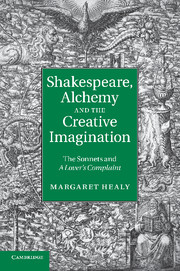Book contents
- Frontmatter
- Contents
- List of illustrations
- Acknowledgements
- A note on the texts
- Introduction
- 1 Alchemical contexts
- 2 Lovely boy
- 3 The dark mistress and the art of blackness
- 4 A Lovers Complaint by William Shake-speare
- 5 Inner looking, alchemy and the creative imagination
- 6 Conclusion: Shakespeare's poetics of love and religious toleration
- Notes
- Index
6 - Conclusion: Shakespeare's poetics of love and religious toleration
Published online by Cambridge University Press: 18 December 2013
- Frontmatter
- Contents
- List of illustrations
- Acknowledgements
- A note on the texts
- Introduction
- 1 Alchemical contexts
- 2 Lovely boy
- 3 The dark mistress and the art of blackness
- 4 A Lovers Complaint by William Shake-speare
- 5 Inner looking, alchemy and the creative imagination
- 6 Conclusion: Shakespeare's poetics of love and religious toleration
- Notes
- Index
Summary
But stay, I see thee in the Hemisphere
Advanc'd, and made a Constellation there!
Shine forth, thou Starre of Poets, and with rage,
Or influence, chide, or cheere the drooping Stage;
Which, since thy flight from hence, hath mourn'd like night,
And dispaires day, but for thy Volumes light.
(Ben Jonson, ‘To the memory of my beloved, The Author Mr William Shakespeare: And what he hath left us’)In the first prefatory poem of the 1623 Folio, Ben Jonson pays homage ‘To … my beloved, The Author Mr William Shakespeare’, significantly likening Shakespeare's power ‘to charme’ to that of Mercury, and his ‘influence’ to that of a ‘Starre’. In this witty deployment of the terms of Ficinian natural magic, Shakespeare shines forth as a ‘Constellation’ in the heavens and is urged to project his powers on to the ‘drooping Stage’. His ‘Volume’, meanwhile, radiates spiritual ‘light’ in darkness. Interestingly, Jonson's lines allude, very specifically, to the Shakespearean ‘art’ of poetic making:
Yet must I not give Nature all: Thy Art,
My gentle Shakespeare, must enjoy a part.
For though the Poet's matter, Nature be,
His Art doth give the fashion. And, that he,
Who casts to write a living line, must sweat,
(Such as thine are) and strike the second heat
Upon the Muses anvile: turne the same,
(And himself with it) that he thinkes to frame.
- Type
- Chapter
- Information
- Shakespeare, Alchemy and the Creative ImaginationThe Sonnets and A Lover's Complaint, pp. 195 - 210Publisher: Cambridge University PressPrint publication year: 2011



